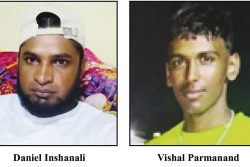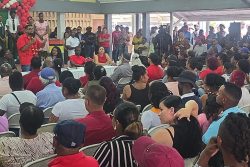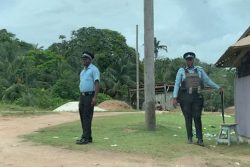Tomorrow will mark the 254th anniversary of the outbreak of the 1763 uprising. It did not start on the 23rd February, as is popularly supposed, and it did not have its genesis on Plantation Magdalenenburg in Canje, again as is popularly supposed. Technically speaking, the action probably began on the plantation of Hollandia on the Berbice River proper, which automatically involved Lelienburg next door, because the first two leaders of the rising were based there. They were part of a conspiracy involving a group of Berbice plantations in a part of the river the Dutch called Head Division.
The matter of the date and the original location for the uprising have been known for decades, but still the same old misinformation is regurgitated, even in Guyana’s classrooms. One suspects that the Grade Six Assessment children also still recite that February 23rd is when the revolt took place, and not February 27th. It is just one example of how difficult it is to feed new historical information into the system, more especially the education system, and furthermore, to persuade the people ensconced in that system to keep abreast of whatever research is being done in the field of their own history.
First, it must be remarked that there are two levels of historical exploration involved here: one is the level of primary research, and the other is what one might call the popularising of select information derived from that research. In some areas of primary investigation there is vibrant activity, although this is not filtering down to the schools, or indeed, the populace at large. The occupation of what is now Guyana is of great antiquity, and we have the indigenous people to thank for that. Archaeological work in the Rupununi and Berbice – the latter involving the excavation of the remarkable raised field system of the Arawaks – has produced some astonishing findings, but it would be surprising if much of that has seeped into the school system at large, as opposed to selected schools. This is despite the fact that newspaper articles have been published about the work being done.
It is likely that pupils in the primary system, especially, still only learn about how the ‘Amerindians’ make cassava bread and the like. There is absolutely nothing wrong with this, but it does not accord the nine nations who have made their home here – some of them for milliennia – their true historical dimension. And even with regard to the colonial period, children are only taught the formulaic material about the indigenous people recapturing African runaways for the plantation owners. In fact, it is only towards the end of the slavery period that this happened, although at an earlier stage the Caribs had done so. It might be added that the Caribs also recaptured ‘Amerindian’ runaways.
But then the story of the Caribs is an altogether different one from that which is popularly portrayed; they were historical agents in their own right in Dutch times, and it was partly due to their efforts that the Spanish penetration of our territory was prevented. Pupils are taught about the African slave trade, but know nothing about the indigenous one in this country in the 17th and 18th centuries, many of whose victims were sold in Suriname – but then, the teachers don’t either.
There are a number of solid academic works on the Indians, probably because the documents in relation to their historical experience are in English, whereas for much of the slavery period, the majority of the sources both for Africans and the Indigenous people are in Dutch. How much of that work is available in popular form, however, is very much a moot point.
One of the great bridges between academic research work, and disseminating new perceptions of our history to the wider audience used to be the History Department of the University of Guyana, but sadly, that separate department no longer exists in the current arrangements. The MA programme there, run first by Prof Mary Noel Menezes and then by Dr Winston McGowan and his successors, produced a body of useful theses, whose students engaged in primary research. It was some of the graduates from the BA and even the MA programme in history who used to go into the schools to teach, which allowed for fresh insights into our past to be aired in the classrooms. In addition, it was none other than President David Granger, who in a different incarnation, was the driving force behind the History Gazette, among other things, which was intended not just for students, but for a wider reading public.
The loss of that department in its old form is a tragedy not just for the university, but for the country as a whole. A people should not be severed from their history; they need a sense of where they have come from and how they have reached where they are. It is an integral element in their identity, in their confidence as a group, and in the approaches they see as possible for their future. It is the primary ingredient in the Guyanese spirit.
Of course students are no longer interested in studying history, because they believe it opens few career prospects for them other than teaching – itself unfortunately also no longer an appealing vocation. Nowadays, it’s all about business studies. But even business – and science – students need an acquaintance with history and, it might be added, literature and the arts too; they are the bedrock of a culture.
It should be added that young people in particular, do not read as the older generation used to do, so even that historical material which is available to them they are disinclined to read unless it is for some school assignment or the like.
In the meantime, historiography does not grind to a halt; research into our history and pre-history continues, in the case of the first, beyond our shores. Currently, work is being done on the 1763 uprising, for example, which judging by the few articles which Marjoleine Kars, a Dutch scholar, has so far written, exposes a whole range of data that no one in this country, or elsewhere for that matter, ever dreamed about. Even for those who like to read, books are expensive in this country, and one wonders just how many Guyanese will have access to her book when it is eventually published.
Of course the ‘history’ that everyone is exposed to is that churned out by the politicians of one side or the other, which qualifies as polemic more than anything else. It covers the period only from the 1950s onwards, and the accounts are rarely adjusted, despite work on the period done by serious academics like Clem Seecharan and others. Guyana has been poisoned by its recent past – or more properly by the political perceptions of its recent past. There is no reconciling there, because it reflects what still divides the major parties, and as such, children can only be given a very anodyne and skimpy version of what transpired.
That said, there is one question where there can be complete historical reconciliation between all political sides. Guyana is expecting that the nullity issue in the Venezuelan border controversy will be referred to the International Court of Justice by the UN Secretary General next year. An enormous amount of historical, legal and other work has been done on this matter over more than a century, and what remains is for Guyanese as a whole to be sensitised to the validity of our case and informed about its key historical constituents. In fairness, the political parties are all singing from the same hymn sheet, but what needs to happen is for all Guyanese to become familiar with the merits of our historical case, so they present a unified front, and can tell any passing foreigner, or even an ordinary Venezuelan if necessary, why Guyana’s right to Essequibo is unassailable.
There are many things which can be done, but can’t the powers-that-be produce historical material for use in schools at both the primary and the secondary levels, and find some course in which the matter could be addressed at the university level, if that is not already happening? As far as the wider population is concerned, there are all kinds of things which can be undertaken; it just takes a bit of imagination ‒ and a budget.
Standing as one in relation to Venezuela, with everyone convinced of the justice of our cause, will give us a sense of a shared history and at the same time reconfirm our identity.








